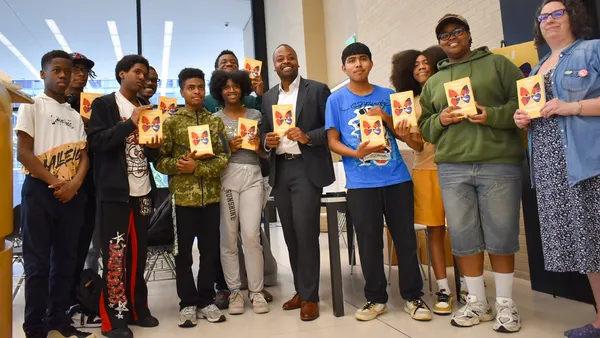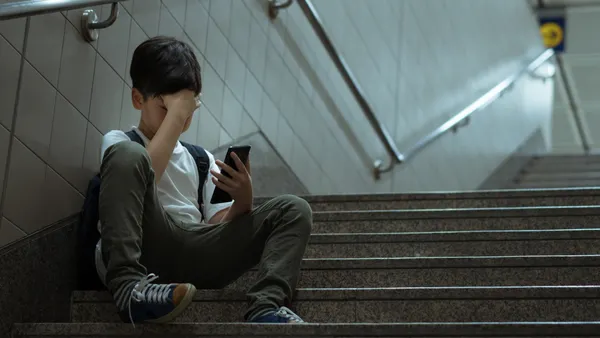On the lower level of what looks like any other nondescript low-rise office building in Reston, VA, is a school that, alongside a Silicon Valley startup, hopes to revolutionize K-12 education. A Montessori, Berthold Academy was founded by veterans of that particular school model. And it is one of AltSchool's first partners.
When I arrived at the school on a recent morning, I was greeted by co-founder Garrett Wilhelm, who also serves as head of school. Along with Rodney Berthold, the academy's namesake and lead upper elementary and middle school educator, Wilhelm launched the school in 2015 with eight students in an adapted townhouse. The total space at the time was about the size of the current location's 7200 sq. ft. foyer. They expect their max capacity to be at about 80-100 students.
"Our idea was to modernize Montessori," said Wilhelm. "As a Montessori teacher and educator for almost 20 years, we’ve seen that Montessori has, as well, become an institution, and because of that, you have a lot of judgment — a lot of sticking to things that aren’t necessarily relevant anymore."
In a time where personalized learning has become all the rage, the Montessori model is touted by practitioners as having embraced that notion for the past 100 years. The model utilizes student agency and small class sizes, often grouping students together for lessons based on their strengths rather than ages and allowing them to learn at their own pace, with educators guiding them along the way rather than speaking at them and hoping what they're saying sticks. One thing that sticks out during my time at Berthold, however; the students all look overjoyed to be at school and deeply engaged in their various activities.
However, despite its benefits, the model is difficult to scale at larger traditional schools which sometimes have as many as 30 students in a classroom. But the AltSchool partnership could make doing that easier in the long term.
How does the AltSchool partnership work?
One thing Wilhelm is adamant about is that partnering with AltSchool doesn't mean that the students just have their faces in electronic devices all day. When the company's platforms — Portrait and Playlist — are implemented in the coming school years, they'll essentially facilitate the experience of guiding students along throughout the day, freeing educators from several administrative tasks, so they can spend more time on meaningful interactions with students.
Following their morning meeting, students will check in with the Playlist platform, where they’ll find specific lessons assigned to them for that day, week or month as a reference point for what they have to get done. It provides visuals via digital cards to give them a sense as to what the lesson’s about, and may prompt them to meet with an educator in a group, or attend a lesson in the classroom or complete follow-up work. As they proceed, their progress is tracked in real-time on the Portrait platform and expressed in a very direct, verbal way.
It’s not just a data spreadsheet, Wilhelm said. It’s real language that tells you what they’re really proficient in and what they’ve mastered, based on certain benchmarks they’ve set along with Common Core and other standards. Parents can also receive updates on how their children are doing based on what they're clicking on and what educators are reporting.
The apps can also be customized based on partner schools' needs, with AltSchool staff available to make adjustments as needed.
On Berthold's end, the partnership came about when Wilhelm and technology discovery educator Sze Wong, also an early investor and business adviser in Berthold Academy, were thinking outside of the box about expanding. While thinking about creating their own in-house organizational and tracking system, they discovered what they were looking for was already happening with AltSchool. While on a trip to New York City with the school's upper elementary students, Wilhelm received an email from Wong about AltSchool's Open Platform program. He filled out the questionnaire via his phone on the ferry to Ellis Island.
"I’m very passionate and I know the mission of our school, and I just put together something very meaningful and sent it over," Wilhelm said. "Sure enough, the next week I was called by Avra Durack [AltSchool’s head of business development], and we talked and had a great conversation."
After several more meetings, including a trip to San Francisco, Berthold became the startup's first partner school. That AltSchool, which has received over $100 million in funding from a list of investors that includes Facebook's Mark Zuckerberg, was mission-driven in a similar way was critical. For Wilhelm, it's a long battle to change education, but he feels Max Ventilla's company is on that path.
For Ventilla, a former Google exec whose team worked to personalize search results, there are four key components he looks for in partner schools.
-
That they would be successful without AltSchool
-
That they’re educationally aligned
-
That they would get real value from the company's platform
-
That they would be able to actually help AltSchool figure out what to build and how to build it
"In the same way that, when we got started, we felt it essential to actually engage in the practice of running the school, as we look ahead to having a real scalable platform that takes the best of what we use to support our own lab schools, but makes it available and makes it effective for schools that we don’t run, that may be practicing a very different kind of pedagogic model in terms of things like curriculum and content than what we would practice," Ventilla said in a phone call.
As for the "lab schools" run by AltSchool itself, they'll likely play a role in the partnerships, as well. Wilhelm expects there will be a network effect, by which AltSchool's lab schools and partner schools will all share best practices with one another via "AltSummits," despite potential differences in philosophies, pedagogies and operational models.
"How can this assist your Waldorf education? How can this assist your traditional education?" said Wilhelm. "Whatever it may be, Montessori provides value just in the sense of looking at it in a different way. If a child is struggling with 1-10 just looking at it on a piece of paper, put some manipulatives in their hands."
"The more we have the right brains in their fields come together with open minds, the more we can provide a better experience down to the student, down to the user."
What does a typical day at Berthold look like?
On a typical day at Berthold Academy, students arrive around 8:15 or 8:30 and have 20 minutes of yoga and 10 minutes of meditation. The school has a 200-hour trained yoga teacher on staff who comes Tuesdays and Thursdays and does the actual 8 limbs of yoga, teaching the benefits of learning yoga beyond the physical practice. Wilhelm says they've found that kids are much more productive after yoga, and the school also has a partnership with Lululemon and Ivivva for blocks and mats. On a nice day, the kids might alternatively go for a walk outside.
After yoga, students have individual work time, during which Rodney or lower elementary lead educator Jaya Kedar might engage students in small groups or make sure everyone is on task. Assignments are made based on those groups, which are focused around individual subjects such as literature and history.
During my visit, the lower elementary students were participating in a tech discovery session with Wong. Their current project: assembling their own Raspberry Pi computers. A look around the room reveals that many of the students have already assembled the computers, connected them to monitors and accessed the sandbox video game Minecraft. In the coming weeks they'll attach them to handheld monitors and design their own housing for the hardware using cardboard.
Throughout it all, Wong largely leaves them to their own devices — pun intended — and answers their questions with more questions, encouraging them to experiment and explore. " Some of them get confused, but that’s part of why we try to let them discover," he said.
Displaying a coding curriculum that provides a card with lines of code, Wong tells me the students are told to enter them at the website provided to get a result. He never tells them what it is or why they’re doing it, but within three weeks, they start figuring out how to alter the code on their own to create more commands. “That’s the magic of letting them loose,” said Wong.
"We’re so afraid to fail as a society," said Wilhelm. "And we’re kind of disrupting that and saying, ‘No. Please fail. Please try.’ If you fail, you’re gonna learn from that experience and you’re gonna get there eventually."
From 11:30 to about noon, students have recess, followed by lunch, during which time they're free to cook their own fresh lunch using skills they learned in culinary class — perhaps using crops grown in the school's own garden. This period also gives them free time to work on other things.
Some students choose to utilize this time in the school's music room, which features instruments including guitars and a drumset. Wilhelm and Berthold have both spent time as professional musicians, and providing students with experience on an instrument they might play beyond grade school, as opposed to a recorder, is important to them.
"The recorder to me is like the most pointless instrument ever, because it doesn’t sound very good and you want music to kind of excite kids," Wilhelm said.
The music room also features an extensive collection of albums, some of which have essentially been donated by parents, so students can hear a piece of music if it's being discussed.
The afternoons tend to have more practical education and large group lessons — featuring cultural subjects like culinary, science, art, P.E. and Spanish — alongside more individual work time and small group lessons.
Berthold says the school also has one special needs student who comes later in the day and has to use a device to communicate and needs special assistance. Though he’s 9 and would technically be a fourth-grader, he’s so advanced, he’s at the Algebra II level in Math. "I don’t think that would ever happen in a public school environment, where someone would be able to go that far ahead,” said Berthold, noting that even in a gifted and talented class, there's still a certain rate where there’s a limit.
"But for a kid like that, the sky’s the limit," he said.
While Berthold noted advanced progress like that is an extreme example, he said it’s not unusual for him to have some students who are working “way, way above their grade level on certain things.”
At the other end of the spectrum, he noted there are students who might be held back in a traditional school because of certain subjects, and then they’re not with their peer group as a result. "That’s not good, either," he said, adding that a student who’s doing fine in everything but needs some slower-paced remedial instruction in say, math, doesn’t need to be held back if you can provide diverse educational opportunities to them.
"Kids don’t have to be held back. They can reach their potential."
With the AltSchool platform, the hope is that the personalization process will become that much quicker as far as making decisions on things, such as who to group together for example, while preserving that "free-range" learning vision where teachers serve more as guides than a "sage on a stage," so to speak.
And for educators, Berthold Academy hopes to reform the profession as well. While Wilhelm didn’t want to set out a number, he said the ultimate goal is to pay their teacher salaries at something "unheard of for a teacher." He wants to see teachers valued the same as a lawyer or a doctor, "because none of them would be there without a great teacher."
But passion is also key when the school hires.
"You really have to love each and every one of your students," said Berthold. "A red flag for me would be if I heard, ‘Oh, I really don’t like that kid.’ Alright, you just closed that door right there. You have to like each and every one of your students. That’s mandatory."
Of course, there's no one-size-fits-all plan. Being knowledgeable in a variety of subjects, watching and noticing verbal and nonverbal things some other adults might not pick up, and being flexible when plans don’t work is also key.
"We should be surrounded by educators who care," said Wilhelm.











